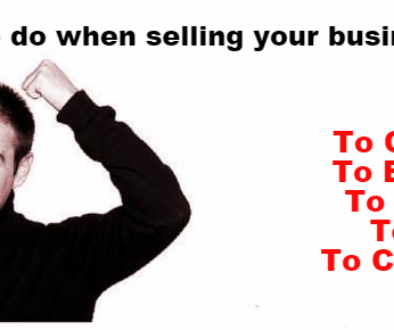Small Business Owners: When is it Time to Sell Your Business?
The Answer — in a Nutshell: The best time to sell a business is when the business has upward trending revenues, when the industry is in an upturn, when the economy is strong, when there is a multitude of buyers looking for business acquisitions, and when interest rates are low.
There are many questions that need to be answered before an informed decision can be made. Is selling the business your best alternative? Will one of the kids want to take over the business? Timing is everything. Is now the right time? You figure that you don’t have to sell or decide right now. You are quite busy so maybe you will look into it after…..or maybe tomorrow…..or next year……
Facing the issue of succession or continuation of one’s business is not addressed with much enthusiasm by the average small business owner. But only one of three eventual fates exist for a business:
- Transfer to family, employee, customer, or vendor
- Sell to an outsider
- Close down
Although the overwhelming majority of business owners wish for their businesses to continue, most small businesses will simply close down because of lack of planning or lack of knowledge on the subject. Based on US Small Business Administration statistics, small businesses employ more than half of the private work force and are responsible for half of our nation’s gross domestic product. Since small business is the backbone our economy, it is important to increase the amount of small businesses passing to new owners once the previous owner is ready to exit.
Why Don’t Business Owners Sell?
The largest single reason that most businesses are not sold or transferred seems to be that the owners never made the active decision to do so. Selling a business is not a passive effort. It takes clear, decisive actions and preparation. Every business can be sold if the following conditions are in place.
- Owner(s) has done his/her homework and fully understands the process of selling a business.
- Owner(s) recognizes the natural cycle of business ownership and makes a timely decision and preparations to sell.
- The company is properly prepared for sale before marketing efforts begin.
- The right buyer and the optimum price are identified before going to market.
“I am considering the sale of my business,” is the initial phrase we hear most often from business owners. Very few will tell us they have decided to sell. This is understandable as information is required before an informed decision can be made. Some of those that have decided to sell, have waited too long, and have nothing left to sell. You cannot sell a business for an optimum price when you are not profitable. No one wants to buy a company that is essentially going-out-of-business. It is best to consider selling when revenues are on the upswing.
The following are the questions most commonly asked when selling is considered:
- What is my business really worth?
- How can I find the right buyer and still maintain confidentiality?
- Are there steps I can take to increase my company’s value?
- How long does it take to sell a business?
- Are there buyers out there with the money I want?
- Will I have to finance part of the sale? If so, how much?
- What will I do after I sell?
- How much money would I have after the sale?
- Would I have to stay on for long? Would they keep my employees?
- What expenses are involved in selling?
- What kind of investigation will a buyer want to perform?
What is important to remember is that the timely decision to do something with your business is the single most important factor impacting your ability to cash in on your investment in your business. You cannot wait until you are compelled to sell nor can you expect an offer you cannot refuse to come out of the blue. Decisive actions must be taken by the owner in order to sell the business. Common reasons for selling:
- Retirement
- Health considerations
- Lease expiring and you do not want to renew for another term
- Changing technology and renewed vision or expertise is required
- Not interested in investing additional long-term capital
- Children do not want to enter the family business
- Under capitalization
- Divorce or partnership dissolution
- Burned out, tired, need a rest
- Passion for the business is gone
So, You’ve Decided it is the Time to Consider Selling. What Does an Owner Do?
First and foremost, maintain confidentiality. Without confidentiality you risk the chance of customers going elsewhere, your employees jumping ship, your creditors tightening their terms, and competitors pouncing on what they would perceive as an opportunity to gain advantage. This is the primary reason that business owners choose to use a business broker to represent them in the sale of their business. A properly educated and licensed business broker will prepare and market your business in a confidential manner so the firm can continue while the broker screens and selects buyer candidates.
An exit strategy is all about preparing your firm for the eventual sale — on your terms. Therefore, it is important to prepare it in such a manner that is attractive to a wider range of potential buyers. You will need a strategy that will maximize your selling price and minimize the tax impact. This is where a professional business broker brings the greatest value to the process. They are aware of what buyers are looking for and can suggest strategies to satisfy their needs making your business a more attractive proposition. A successful business brokerage firm maintains a large network of professional advisers, such as accountants, attorneys, and bankers to which they can refer you should you not already have one that is experienced in business transfers.
A prudent choice is to select a successful Business Brokerage firm in your market area to represent you in the sale of your business and guide you through the entire process.




